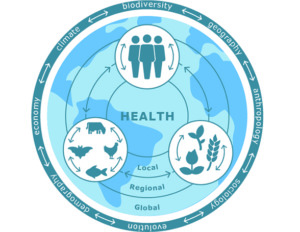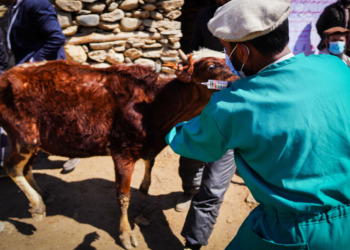Since the 1800s, scientists have noted the similarity in disease processes among animals and humans, but human and animal medicine were practiced separately until the 20th century. In recent years, with the support of key individuals and committed advocates such as the One Health Commission and One Health Initiative, the One Health concept has garnered more recognition in the public health and animal health communities and broadened to include the interface with the environment.
But much remains to be done to make One Health a guiding public health principle across the globe. In a recent article, I noted that crucial components appear to be in place for a major One Health take-off. Indeed, the international community recently expressed multiple supportive policy statements and engaged in conferences or meetings in which One Health was on the agenda.

Furthermore, there is vocal and growing support from the scientific community; for example, Wageningen University in the Netherlands has taken a proactive One Health approach to tackle a series of pressing health issues, such as antibiotic resistance, which are not only complex problems but further complicated by the fact that bacteria are not hampered by borders in our globalized world. As the Wageningen researchers put it, a “Global One Health approach” that includes “a focus on national and international policies, research and applications” is needed to tackle such issues – as we have certainly learned with the COVID pandemic.
More good news: There is substantial new funding that either exists, is pledged, or is under discussion, as in the case of the new Pandemic Prevention, Preparedness, and Response Financial Intermediary Fund (FIF).
These are all hopeful signs that momentum for the One Health approach is taking hold in academic, technical, financial, and nonprofit circles, and that low and middle-income countries are increasingly considering how to deal with this challenge – each a necessary condition to transit to large-scale concrete actions.
But widespread adoption, broad support and real traction will only become a reality if the One Health approach is embraced as a core component of international and national cooperation, coupled with local and external investment, and most importantly by citizen buy-in.
What can move the needle in the right direction are public figures, point persons who can maintain focus and sustained cooperation across sectors to succeed. Success here is defined as the adoption of OH principles in public health policies and programs in all UN member states.
Lessons from the past: Other cross-cutting, multisectoral priorities that have succeeded, such as nutrition and gender
What these subjects have in common are long histories of being in the shadows until the cumulative efforts of committed scientists and advocates reached a critical mass and crossed over to public awareness and concern.
Underlying each was an in-depth evidence base that provided the “hard power” to move aggressively into the public space with high-profile champions, able to generate media opportunities, and actively engage. These individuals are the “soft powers,” the influencers who bring forward what is a common cause.
The terms “hard power” and “soft power” come from political scientists in the context of geopolitics and influence, such as the Ukraine invasion where Russia is winning with hard power (weapons and armies), while Ukraine is winning in the arena of global public opinion, e.g., soft power.
These terms were coined by the American political scientist Joseph Nye in his 1990 book, “Bound to Lead” in which he defined soft power as “getting others to want what you want.”
What does this mean for One Health?
Supporters of One Health do not commonly look upon their efforts as being in competition in gaining attention with other compelling ideas. But there is some truth in this; the public commons have room for just so much, and if forced to choose between the immediate and later, the better or lesser publicized, it will invariably choose the former.
The quantity and quality of outreach and messaging become crucial as Marshall McLuhan a communications theorist said in the last century, “The new electronic independence re-creates the world in the image of a global village”. And the more effective users are the more likely to win.
Simply put, widespread social media messaging and well-known public figures combine in the twenty-first century to shape the public commons. Such personalities come from the worlds of entertainment, sports, business and finance, and politics.
Finding that personality, as a spark for the One Health community, has not yet happened. With the pandemic and heightened interest by international technical agencies, funding institutions, academics, and think tanks, the prospects may be improving.
But perhaps One Health could flip the order by first gaining visibility at the United Nations as a means of attracting high-visibility spokespeople.
Appoint a UN System One Health Coordinator
Beginning in the last century with the HIV/AIDS pandemic, and over the past 20 years, the world has encountered several major public health emergencies caused by zoonotic diseases, including severe acute respiratory syndrome (SARS; 2002–2004), Ebola virus disease in West Africa (2013–2016), Zika virus in the Americas (2015–2016).
The response typically included the establishment of a disease-specific “Coordinator” by the UN Secretary-General for the UN system. These were cases of urgent response to a specific pandemic, and this is the case with COVID.
In February 2022 United Nations Secretary-General António Guterres appointed a Global Lead Coordinator for COVID-19 Vaccine Country-Readiness and Delivery. The Coordinator is to lead a senior inter-agency team to ensure an effective global response to the pandemic, support COVID vaccine country readiness and delivery, coordinate inter-agency efforts to forecast vaccine needs and provide financial and technical assistance to overcome bottlenecks in country-level implementation.
The playbook is very similar when a multisectoral challenge rises to become a global major priority such as food security and nutrition (Scaling Up Nutrition) and gender equality and the empowerment of women. In each instance, the UN Secretary-General appointed one Coordinator to oversee global efforts.
This is perfectly describing the situation with One Health. Unquestionably multi-sectoral, touching on many of the Sustainable Development Goals, it fits neatly into the broad global objectives.
A recent article identified what still needs to be done for the full integration of the environment in the One Health approach. In this regard, four major UN agencies, namely WHO, WOAH, FAO and UNEP agreed on a unified definition of One Health.
But the four agencies did more. With support from France and Germany, a High-level Panel of Experts, (OHHLEP), was established based on cross-sectoral collaboration between the four agencies; the panel is set to meet up to six times a year. It has already established four working groups that will:
- review good practices in One Health implementation and, inter alia, develop a “theory of change” to make One Health go from a theoretical concept to daily practice;
- make an inventory of current knowledge in preventing emerging zoonoses;
- define One Health surveillance and develop a practically implementable surveillance framework and good practice guidelines, including early detection of emerging zoonoses;
- identify factors causing spillover and subsequent spread of diseases, including “wildlife trade, food production and distribution, traditional markets, land-use changes, biodiversity, animal production and trade, human action, biosafety and biosecurity, any other relevant environmental issues, including climate change”; the group is expected to consider tools already available for multisectoral risk assessments and investigate if HACCP (Hazard Analysis Critical Control Point) or TACCP (Threat Assessment and Critical Control Points) principles could be adapted as risk assessment possibilities.
While it is early days to judge what will come out of these working groups, this is a welcome step in the right direction.
At present, however, it involves only four UN agencies while One Health should be pursued across the UN system and in the context of the seventeen Sustainable Development Goals.
A way to do so is for an appointment of a UN Secretary General’s system-wide “One Health Coordinator”. That person would be tasked to ensure that the findings of OHHLEP do not remain circumscribed to the afore-mentioned UN technical agencies but integrated system-wide. The One Health Coordinator would inter alia share relevant research, and organize meetings and conferences, conceivably at a Special Session of the United Nations General Assembly. That could lead to an International Conference on One Health as was the case with the International Conferences on Nutrition. Further, the One Health Coordinator would engage with global and regional financial institutions to provide the wherewithal to accomplish agreed objectives.
In short, an appointment now by the UN Secretary General of a UN “One Health Coordinator” would provide the needed visibility and a perch for a global personality to do good. How about it?
Editor’s Note: The opinions expressed here by the authors are their own, not those of Impakter.com — In the Featured Photo: Wildebeests crossing the Mara River, Tanzania Photo by Fredo Durand Flickr










